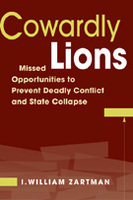I. William Zartman
What would have happened had the "road not taken" been the chosen action in past conflict interventions? What can we learn from a close look at alternatives that were not selected? Drawing on six detailed case studies (the Balkans, Haiti, Lebanon, Liberia, Somalia, and Zaire/Congo), I. William Zartman identifies a series of missed opportunities—options that arguably would have provided feasible and better outcomes for the reduction of violent conflict and the prevention of state collapse.
Zartman specifies potential solutions within the entire trajectory of each conflict, considering in each instance why the indicated decisions were not taken. The principles and mechanisms that he develops in the course of his analysis have profound implications for the actions of the international community in preventing conflicts from escalating to violence, and for managing violent situations when they do occur.
I. William Zartman is professor emeritus at the School of Advanced International Studies, Johns Hopkins University. His many publications in the field of conflict negotiation and management include Ripe for Resolution, Preventive Negotiation: Avoiding Conflict Escalation, Negotiating an End to Civil War, and The 50% Solution. He is recipient of the Lifetime Achievement Award of the International Association for Conflict Management.
“Zartman shows that intervention in the context of deadly conflict and state collapse is not only necessary but also that it can be done more efficiently than in the past.”—Klejda Mulaj, Journal of Intervention and Statebuilding
"As Zartman argues, 'analysis is always hortatory, serving as the basis for action, and exhortation should always be analytical, based on sound examination and reasoning.' This well-stated position is equally well carried out by Zartman one of our discipline's lions, and never a cowardly one."—Bruce W. Jentleson, International Studies Review
"[A] significant contribution to the literature on conflict management and resolution."—Choice
"Enlightening and timely. Zartman deftly probes the lessons that can be learned from the international community's failure to prevent deadly conflict and failed states."—Lee Hamilton,Woodrow Wilson International Center for Scholars
"Zartman has pushed the intellectual envelope of conflict prevention to a new high. Founded on solid, historical research, his book gives both academics and practitioners new and important guidance on how to deal with the challenges of the 21st Century."—William L. Nash, Council on Foreign Relations






